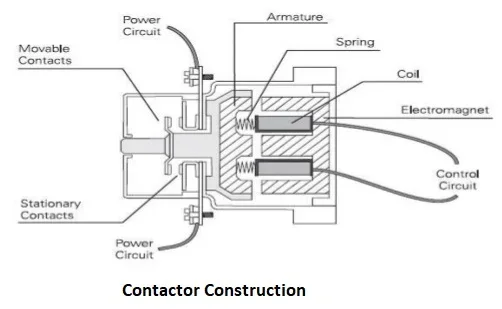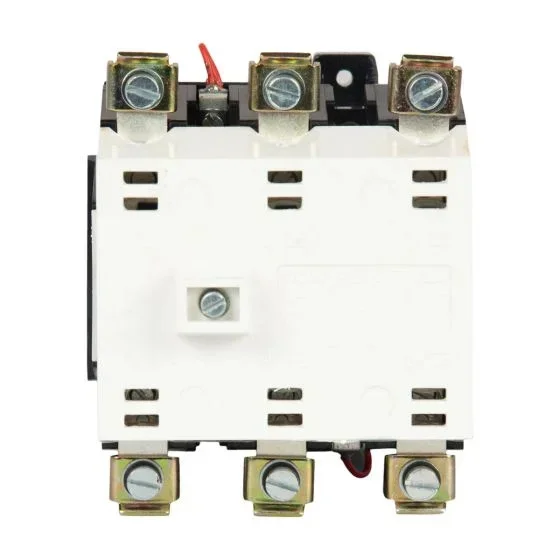What is a Power Contactor? Understanding Its Function and Working Principle
Reliable and efficient power management is crucial in the present rapidly advancing industrial and electrical environments. Power contactors are among the most essential devices. They are used significantly in electrical systems. But what is a power contactor? How does it function? Continue reading this blog to learn all about these devices. This blog will delve into the intricacies of this indispensable device. It will explore its types, working principles, and applications.
Table of Contents
- What is a Power Contactor?
- Power Contactor Working Principle
- Types of Power Contactors
- Power Contactor Specifications
- What is the Use of Power Contactor?
- Factors Influencing Power Contactor Price
- Applications of Power Contactors
- Advantages of Power Contactors
- Choosing the Right Power Contactor
- Conclusion
What is a Power Contactor?
A power contactor is an electrically controlled switch. It handles high-current loads in industrial, commercial, and residential electrical systems. Power contactors are specifically engineered to manage and control heavy electrical loads. They are used in motor control systems. These devices are also used in lighting circuits and heating systems. Power contactors ensure seamless operation and safety. They come in different configurations and specifications. As a result, they meet diverse application needs.
Power Contactor Working Principle

You must understand the power contactor working principle. It will help you appreciate its role in electrical systems. A power contactor operates using the principle of electromagnetic attraction.
1. Electromagnetic Coil Activation: An electric current generates a magnetic field when it flows through the contactor's coil.
2. Contact Closure: The magnetic field pulls the armature. It closes the contacts and allows current to flow through the connected circuit.
3. Circuit Control: The contacts remain closed as long as the coil is energized. Once the power is cut, the magnetic field collapses, and the contacts return to their open position. This straightforward yet effective mechanism ensures reliable control of high-current circuits with minimal manual intervention.
Types of Power Contactors
Power contactors are available in various types to suit specific requirements. Two popular types are:
- 3 Pole Power Contactor
- 4 Pole Power Contactor
A 3-pole power contactor is designed for three-phase electrical systems. Each pole corresponds to one phase, making it ideal for motor starters, pumps, and other three-phase equipment. Its compact design and efficient operation make it a common choice in industrial applications.
The 4-pole power contactor is used in systems where a neutral line is required in addition to the three phases. This configuration is often found in lighting and HVAC systems. The fourth pole enhances safety and provides better control for neutral currents.
Power Contactor Specifications
When selecting a power contactor, understanding its specifications is crucial. Some key power contactor specifications to consider include:
Voltage Rating is the maximum voltage the contactor can handle.
The current Rating is the maximum current capacity of the contactor.
Coil Voltage is the voltage required to energize a contactor's coil.
Pole Configuration refers to the number of poles, such as 3-pole or 4-pole power contactors.
Auxiliary Contacts are additional contacts for control and signaling purposes.
What is the Use of Power Contactor?
Primarily, the purpose of a power contactor is to control and protect electrical systems. They do so by managing the current flow. Some common uses of power contactors include:
1. Motor Control: Power contactors are widely used to start, stop, and control electric motors in industrial settings.
2. Lighting Circuits: They efficiently manage large lighting loads in commercial spaces.
3. Heating Systems: Power contactors control the power supply to heating elements.
4. Safety and Protection: They safeguard electrical systems by disconnecting power during overloads.
Factors Influencing Power Contactor Price
The power contactor price varies based on several factors, including:
- Brand: Renowned brands like Lauritz Knudsen Electrical & Automation offer high-quality contactors with advanced features, which may affect the price.
- Specifications: Higher current and voltage ratings generally result in higher prices.
- Type: 3-pole and 4-pole power contactors have different cost implications based on their functionality.
- Additional Features: Contactor models with auxiliary contacts, enhanced durability, or specialized coatings may have a higher price. It's advisable to balance quality and cost when choosing a power contactor, as reliability and performance are paramount in critical applications.
Applications of Power Contactors

Power contactors are versatile devices with applications across industries. Some notable examples include:
Industrial Automation: Controlling motors, pumps, and conveyor belts.
Commercial Spaces: Managing HVAC systems and large-scale lighting.
Renewable Energy Systems: Regulating power in solar and wind energy installations.
Residential Use: Ensuring safe and efficient operation of high-power appliances.
Advantages of Power Contactors
Using power contactors in electrical systems offers numerous benefits, including:
1. High Current Handling: Designed to manage large electrical loads safely.
2. Durability: Built to withstand harsh operating conditions.
3. Remote Control: Can be operated remotely, enabling automation.
4. Safety: Protects systems and personnel from electrical faults.
Choosing the Right Power Contactor
Selecting the appropriate power contactor requires careful consideration of your system's requirements. Here are some tips:
1. Assess Load Requirements: Understand the current and voltage needs of your application.
2. Consider Pole Configuration: Decide between 3 pole and 4 pole power contactors based on your system's wiring.
3. Check Brand Reputation: Opt for trusted brands like Lauritz Knudsen Electrical & Automation for reliable performance.
4. Evaluate Features: Look for additional features such as auxiliary contacts or enhanced durability.
5. Compare Prices: Evaluate the power contactor price across models to find a balance between cost and quality.
Why Choose Lauritz Knudsen Electrical & Automation Power Contactor?
The Lauritz Knudsen Electrical & Automation power contactor is a preferred choice for many. They have exceptional reliability, durability, and performance. These contactors have advanced engineering and compliance with international standards. Lauritz Knudsen Electrical & Automation contactors are suitable for a wide range of applications.
Also Read: Everything You Need To Know About AC Contactor
Conclusion
Power contactors are vital components in electrical systems. They offer efficient control and protection for high-current loads. These devices play an integral role in modern electrical setups. Hence, you must understand what a power contactor is, the power contactor working principle, and power contactor specifications.
For top-quality power contactors like the Lauritz Knudsen Electrical & Automation power contactor, consider exploring the SmartShop of Lauritz Knudsen Electrical & Automation. With a wide range of reliable and affordable options, including 3-pole and 4-pole configurations, their products ensure seamless performance for all your electrical needs. Embrace the future of power management with SmartShop and make your systems smarter, safer, and more efficient!


Comments